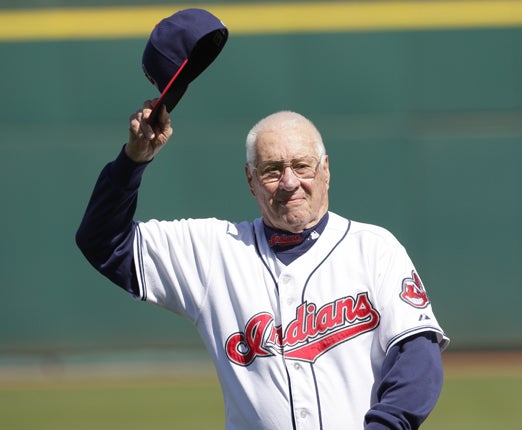Bob Feller: Prodigious baseball pitcher who earned the nickname 'Rapid Robert'

Your support helps us to tell the story
From reproductive rights to climate change to Big Tech, The Independent is on the ground when the story is developing. Whether it's investigating the financials of Elon Musk's pro-Trump PAC or producing our latest documentary, 'The A Word', which shines a light on the American women fighting for reproductive rights, we know how important it is to parse out the facts from the messaging.
At such a critical moment in US history, we need reporters on the ground. Your donation allows us to keep sending journalists to speak to both sides of the story.
The Independent is trusted by Americans across the entire political spectrum. And unlike many other quality news outlets, we choose not to lock Americans out of our reporting and analysis with paywalls. We believe quality journalism should be available to everyone, paid for by those who can afford it.
Your support makes all the difference.Bob Feller was one of the greatest pitchers in baseball history. In his 20-years career with the Cleveland Indians, he won 266 games and struck out 2,581 batters in an era when strike-outs were harder to come by.
He led the American League in strike-outs seven times and would probably have made it 11 titles in a row had the Second World War not intervened. In 1940, 1941 and 1946, on average he struck out 85 more players than the League runner-up; his career-high 348 Ks in 1946 is still fifth on the all-time list.
The possessor of a blistering fastball, once clocked at over 98mph, he quickly gained the soubriquet "Rapid Robert" and intimidated the best batters of his time. Clark Griffith, president of the Washington Senators, pioneered the use of a "speed gun" specifically to time his pitches. Such was their speed, Lefty Gomez, himself a fine pitcher, once reportedly turned to the umpire after taking a called third strike from Feller and asked, "Hey Mac, didn't that one sound a little low?"
Bob Feller was born on an Iowa farm in 1918. He began to follow the game as a child and at the age of 10 caught 50 gophers at 10 cents each to pay for a baseball signed by Babe Ruth and Lou Gehrig. His father taught him to pitch and, as perhaps the most notable prodigy in the game's history, he signed with the Cleveland Indians before graduating from high school.
He struck out 15 St Louis Browns during his first big league game and three weeks later proved it had been no youthful fluke when he tied Dizzy Dean's major league strike-out record and struck out 17 Philadelphia Athletics. He later remembered: "I was pretty excited. I knew I was approaching the record. I was counting those whiffs and the closer I got to that record, the more I wanted to break it. I just kept pouring them in." He was 17 years old.
His war service inevitably precluded Feller from attaining the career statistics that his talents doubtless merited, but he wasn't bitter, later noting, "I know in my heart I would have ended up a lot closer to 400 than 300 if I hadn't spent four seasons in the Navy. But don't take that as a complaint. I'm happy that I got home in one piece."
He won 20 or more games on six occasions and pitched three no-hitters and 12 one-hitters during his career. However, he never won a World Series game. During the 1948 Series he twice lost to the Boston Braves (1-0, 11-5), his 1-0 loss being notable for the incident in which the second-base umpire was perhaps the only person on the field not to have seen Feller and his shortstop-manager Lou Boudreau pick off Boston's Phil Masi. The Braves' catcher was subsequently singled in. Feller didn't pitch during the Tribe's 1954 Series against the New York Giants.
Following his retirement Feller became a mainstay of fan fairs and memorabilia shows, and of the Indians' press box. In 1962 he was inducted into the Baseball Hall of Fame.
Robert William Andrew Feller, baseball player: born Van Meter, Iowa 3 November 1918; twice married (three sons); died Cleveland, 15 December 2010.
Join our commenting forum
Join thought-provoking conversations, follow other Independent readers and see their replies
Comments